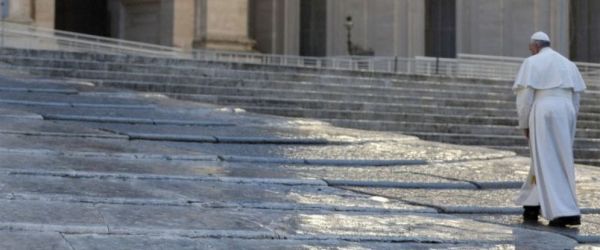There is a recurring question in Pope Francis' meditations during the masses he celebrated at Santa Marta, and it is the invitation to an examination of conscience: "How is my relationship with the Holy Spirit?". Also in his homily on Thursday 16 November, the Pontiff posed the question again with a particular declension: "Do I really believe that the Spirit makes the kingdom of God grow in me?".
In fact, the kingdom of God was the theme of the reflection that started from the passage in Luke's Gospel (17:20-25) in which the doctors of the law ask Jesus: "You preach the kingdom of God, but when will the kingdom of God come?". It is a question, the Pontiff explained, that also came from the "curiosity of many people", a "simple question that comes from a good heart, a disciple's heart". It is not by chance that it is a recurring request in the Gospel: for example, the Pope suggested, at that "very ugly, dark" moment when John the Baptist - who was in the dark in prison and "did not understand anything, distressed" - sends his disciples to say to the Lord: "But say: is it you or must we wait for someone else? Has the kingdom of God arrived or is it another?".
Doubt about 'when' often returns, as in the thief's 'impudent, haughty, wicked question': 'If it is you, come down from the cross', which expresses the 'curiosity' of 'when the kingdom of God comes'.
Jesus' answer is: "But the kingdom of God is in your midst". Thus for example, Francis recalled, "the kingdom of God was announced in the synagogue in Nazareth, that joyful announcement when Jesus reads that passage from Isaiah and ends by saying: 'Today this scripture has been fulfilled in your midst'". A happy and, above all, "simple" announcement. In fact, "the kingdom of God grows from within", so much so that Jesus himself explains it with the parable of the seed: "no one knows how", but God makes it grow. It is a kingdom that "grows from within, in secret or hidden like the gem or the treasure, but always in humility".
Here the Pontiff inserted the key passage of his meditation: "Who gives growth to that seed, who makes it sprout? God, the Holy Spirit who is in us'. A consideration that explains the coming of the kingdom with the Paraclete's way of working, which "is a spirit of meekness, of humility, of obedience, of simplicity". And it is the Spirit, the Pope added, "that makes the kingdom of God grow within, not pastoral plans, great things...".
It is, Francis said, a hidden action. The Spirit 'makes it grow and the time comes and the fruit appears'. An action that eludes full comprehension: 'Who was it, or was it,' the Pope asked himself, 'that sowed the seed of the kingdom of God in the heart of the good thief? Perhaps his mother when she taught him to pray? Perhaps a rabbi when he explained the law to him...'. What is certain is that although in life he forgot it, that seed, hidden, was made to grow at some point. All this happens because 'the kingdom of God is always a surprise, a surprise that comes' in that 'it is a gift given by the Lord'.
In his conversation with the doctors of the law, Jesus dwells on the characteristics of this silent action: "The kingdom of God does not come in such a way as to attract attention and no one will say: 'Here it is or there it is'". In fact, the Pontiff added, "the kingdom of God is not a show" or even "a carnival". It does not show itself 'with pride, with pride, it does not like publicity', but 'is humble, hidden and thus grows'.
A striking example comes from Mary. When people looked at her following Jesus, they hardly recognised her ('Ah, that's Mummy...'). She was 'the holiest woman', but because she was 'in secret', no one understood 'the mystery of the kingdom of God, the holiness of the kingdom of God'. And so, "when she was near her son's cross, people said, 'But poor woman with this criminal as a son, poor woman...'". No one understood, "no one knew".
The characteristic of hiddenness, the Pope explained, comes precisely from the Holy Spirit who is 'within us': it is he 'who makes the seed grow, makes it germinate until it bears fruit'. And we are all called to walk this path: 'it is a vocation, it is a grace, it is a gift, it is free, it cannot be bought, it is a grace that God gives us'.
This is why, the Pontiff concluded, it is good that "all of us baptised" who "have the Holy Spirit within us", ask ourselves: "How is my relationship with the Holy Spirit, the one who makes the kingdom of God grow in me?" We need to understand: "Do I really believe that the kingdom of God is in our midst, is it hidden, or do I like the show better?" It is necessary, he added, to pray to "the Spirit within us" to ask for the grace "to make the seed of the kingdom of God sprout in us and in the Church, with strength, so that it may become great, give shelter to so many people and bear fruits of holiness."
[Pope Francis, St. Martha, in L'Osservatore Romano 17/11/2017]












